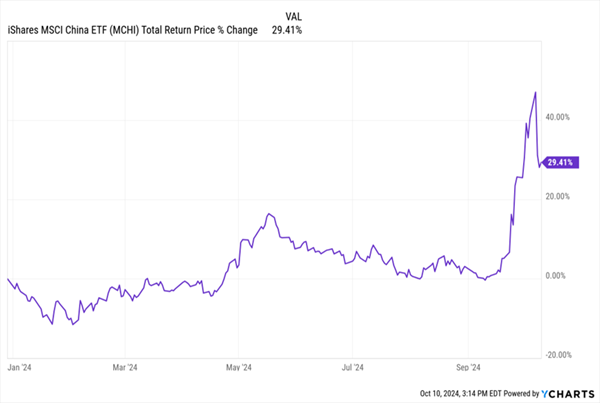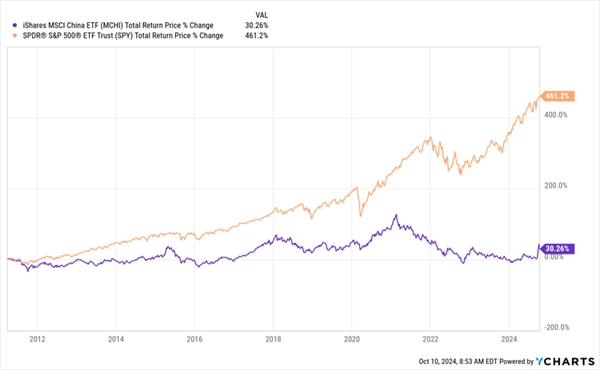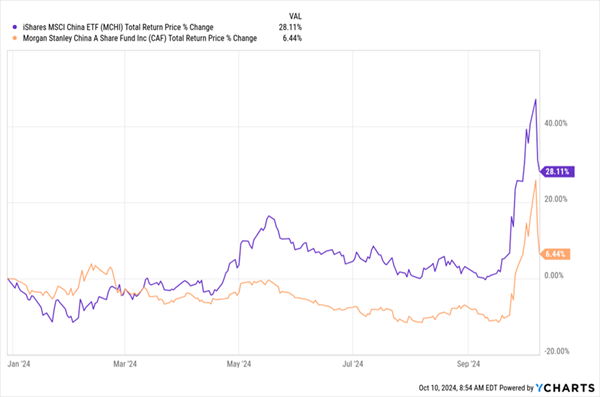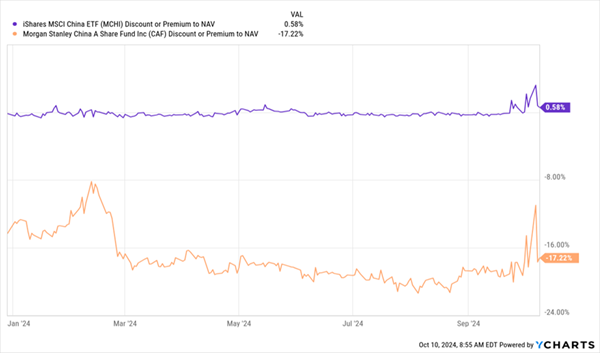When I show you a chart like the one below, your first thought might be that we’re looking at, say, the recent stock performance of NVIDIA (NASDAQ:NVDA)—or maybe a biopharma firm that just dropped a breakthrough treatment:
Not a Tech Stock—Just a “Boring” Index Fund

But you’d be wrong. What we’re looking at here is the iShares MSCI China ETF (NASDAQ:MCHI), an index fund tracking the Chinese stock market, up to its peak early last week.
That jump is the direct result of the Chinese Communist Party’s recently announced stimulus package.
The gains have attracted the attention of Chinese day traders and speculators, as well as those in the West. But—as is often the case with China’s economic moves—there’s still a lot of uncertainty here, as the Chinese government has given few details on what, exactly, it will do. That lack of detail caused a reversal late last week that has dented, but not shattered, the bullish view.
So how do us non-day traders profit from this situation? The obvious way is to buy Chinese stocks—but there’s a big risk here, since foreigners can’t do this directly.
There are ways around this, such as buying US-listed firms like Alibaba (NYSE:BABA). But that adds risk, since stocks like these don’t actually give you ownership in Chinese companies.
This all may sound surprising if you don’t follow Chinese stocks regularly, but Alibaba and other US-listed Chinese stocks are actually tied to something called a variable interest entity that’s registered in the Cayman Islands. So buying Alibaba isn’t just a bet on Chinese stimulus but also on Chinese regulators respecting international law and recognizing foreign investors’ real claim in Chinese firms.
Another way to buy in is through an ETF like MCHI, which invests broadly in Chinese assets, and hope you can get out before this short-term frenzy stops. However, MCHI and ETFs like it aren’t your only option, nor are they even a particularly good one.
The CEF Way to Invest in China’s New Stimulus Package
The real problem with Chinese stocks is that, while short-term wins on a frenzy like this are possible, the Chinese market’s long-term performance has been, to put it frankly, dreadful.
Chinese Stocks Trail (Far) Behind the US

Chinese stocks have returned around a tenth of the S&P 500’s gains, so an investor who bought $10,000 of US stocks in 2011 would have $56,120 as of this writing, while the same amount in Chinese stocks would now be $13,026, leaving over $40,000 on the table.
The key takeaway here is that if you want to play this frenzy, don’t stick around long, or you’ll miss bigger returns elsewhere.
But if you’re still determined to give it a try, MCHI isn’t the best way to do so. To explain this, let’s look at the Morgan Stanley China A Share Fund (NYSE:CAF), a closed-end fund (CEF) that, like MCHI, invests in Chinese companies.
CAF Lags the Laggards (for Now)

As you can see, CAF is underperforming MCHI this year, and the pullback in the wake of the big spike we talked about off the top has been much worse for the CEF than it has been for the ETF. So why would an investor looking to profit off the Chinese stimulus package pick CAF?
The answer is in the question itself. The frenzy has pushed up MCHI, the largest ETF by market cap tracking the Chinese stock market, but it still hasn’t spread to smaller, less-popular Chinese funds. And since CAF, with just a $275-million market cap, is about one-twentieth the size of MCHI, it’s probably going to remain a hidden gem of Chinese stock-market frenzy for a while longer.
That may sound speculative. After all, how can I know that CAF isn’t getting as much attention as MCHI? Well, beyond its lagging performance, there’s the discount to net asset value (NAV, or the value of CAF’s underlying portfolio):
Deep Discount Makes CAF a Better Value Than Its ETF Cousin

Let’s start with the purple line above: MCHI trades at a 0.6% premium to NAV as of this writing. That shouldn’t happen. Typically, market pros look for opportunities to sell an ETF trading at a premium and buy the fund’s underlying assets, as doing so gives them instant profit. This is why big index funds, like S&P 500 ETFs, always trade close to par.
This premium tells us that the difficulty of getting real shares in Chinese companies has made this arbitrage opportunity tough for all but the biggest investors.
That should encourage more speculators to buy CAF, with its 17.2% discount (discounts to NAV are common with CEFs, since their shares are mostly fixed in number, while the value of the assets their shares represent fluctuates during trading hours).
Bear in mind, too, that CAF is trading at a similar discount to where it was before the trading frenzy. That means CAF doesn’t have the big China stimulus–driven recovery priced in, while MCHI does.
Of course, buying CAF means you’ll need to be active, vigilant and ready to sell at a moment’s notice. But that’s all part of day trading.
This is also why we prefer a longer-term, dividend-focused approach at my CEF Insider service (as well as downplaying or avoiding Chinese stocks). After all, when there are CEFs from across the economy (and the world) yielding 8%+ on average, there’s just no need to take on the stress and workload of day trading.
Forget Trying to Time China’s Skittish Market. Do This for Steady 9.8% Payouts.
CEFs are perfect for building the diverse portfolio and income stream we need to fund a low-stress lifestyle, whether we’re in retirement or working to get there.
Which is where the 4 other CEFs I’m recommending today come in. They kick out an outsized 9.8% dividend on average, and I see plenty of upside as their undeserved discounts vanish.
I’ve put together a special investor bulletin that gives you the inside scoop on CEF investing, including how CEFs pay massive yields and how buying a discounted CEF can lead to some truly game-changing upside.
It’s exactly the kind of low-drama, high-dividend approach we need in these uncertain (to say the least!) times.
Disclosure: Brett Owens and Michael Foster are contrarian income investors who look for undervalued stocks/funds across the U.S. markets. Click here to learn how to profit from their strategies in the latest report, "7 Great Dividend Growth Stocks for a Secure Retirement."
